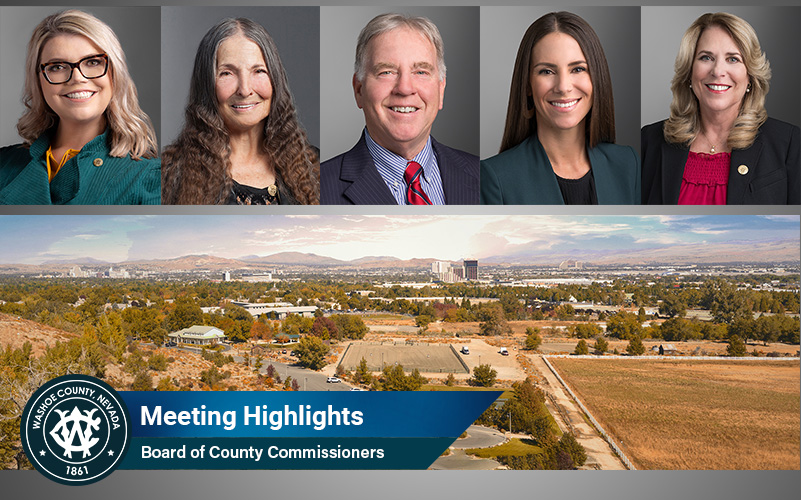The following are highlights from today’s Washoe County Board of County Commissioners meeting:
1. Board approves FY26 budget and Capital Improvement Project plan: The Board approved the budget for FY26, which begins July 1. In a separate action, they also approved the rolling five-year Capital Improvement Project (CIP) plan.
Budget Manager Lori Cooke presented the final proposed budget in a public hearing at today’s meeting. Commissioners previously affirmed their strategic areas of focus for the coming year: mental health, senior services and infrastructure. Staffing has been an area of discussions at previous budget presentations, and Cooke noted that there will be no net new positions and no reclassifications that would result in a cost increase.
The Washoe County Library budget has also been front and center through budget discussions. The Library budget will be flat, which means no budget reductions and no above-base increases. The remaining Library Expansion Fund balance will be spent first in FY26, and centralized General Fund resources of up to $1.3 million will be available only if needed upon approval of Library Board of Trustees.
Other highlights include a $1 million increase in the transfer to Northern Nevada Public Health, and the transfer of eight ARPA-funded positions to the General Fund, to be paid with interest from the ARPA funding.
“It’s taken a little bit of a twist and turn from seeing where it was proposed to where we are now, and I really appreciate all the recommendations and the time you’ve spent with us to try and ensure that we are doing everything we can to live within our means,” Commissioner Clara Andriola said.
The budget was approved 3-1 with Commissioner Jeanne Herman absent and Commissioner Mike Clark dissenting. The next step is to submit the budget to the Nevada Department of Taxation by June 1.
Cooke also presented the five-year CIP plan, which includes projects related to physical assets with an estimated cost of more than $100,000 and a live span of more than one year, as well as purchases, construction, improvement, or replacement of land, buildings, equipment, technology systems, or maintenance. The five-year CIP must be submitted to the Washoe Debt Management Commission and the State Department of Taxation by August 1.
The baseline need for maintenance and repairs is approximately $18 million per year, but the budget does not meet that baseline. The baseline budget will increase this year by $500,000 to $12.5 million with the intent to increase each year until the baseline is reached.
Recommended new Capital Improvement Fund projects for FY26 total $13.7 million and include ADA improvements in the Registrar of Voters Office; several projects at the Washoe County Detention Facility; North Valleys Splash Park resurfacing; court building fire alarm system modernizations; and several technology infrastructure projects.
The CIP plan was approved unanimously by the Board, with Commissioner Herman absent.
2. Board receives update on programs within the Human Services Agency: Human Services Agency (HSA) Director Ryan Gustafson presented an overview of the department and its myriad programs that support seniors, children, vulnerable adults, and those experiencing homelessness. The department comprises 472 employees who serve those most in need in Washoe County.
“You are all helpers and doing tough work for parts of our community that are overlooked and really giving people a second chance,” Chair Alexis Hill said.
Children’s Services include foster care, adoption, child abuse and neglect investigations, clinical services, and more. Child Protective Services (CPS) is a major system of intervention of child abuse and neglect. It begins with CPS staff receiving a confidential report, and based on the information received from the report, it is assigned a priority level determined on the allegation and amount of imminent risk or danger the child may be in. This leads to what response is required from CPS.
The Adult Services Division provides case management services for those individuals in nursing homes and adult group care settings. Adult Social Services also provides coordination and payment for burial and cremation services to Washoe County residents. Also under the Adult Services umbrella is the CrossRoads program, a housing and recovery program for those who are generally homeless and may be suffering from a substance use disorder, mental health condition or both. CrossRoads operates a men’s facility, women’s facility, and soon a families’ facility.
Senior Services improves the quality of life for seniors by offering services, support, and activities that empower their personal independence, and encourages healthy aging, social connection and education. The most visible function of Senior Services is the Senior Centers throughout the county, but the division also notably offers in-home support to homebound seniors, such as Meals on Wheels and Homemaker Services. Senior Services provided more than 435,000 meals to seniors in FY24.
Housing and Homeless Services comprises around 70 employees and the region’s Cares Campus and Our Place shelters. It was folded into HSA in 2023 and provides case management, street outreach programs, and housing programs, all in the effort to get people employed and housed. The division operates on the Built for Zero framework and manages the Northern Nevada Continuum of Care.
“One of the advantages of merging with Homeless Services is that the last thing I would to see is one of the kiddos from HSA aging out and then falling into the Homeless Services system,” Gustafson said. “We’ve been on the forefront of extended foster care, which looks like it’s going to pass at the legislature, so that will create some additional efficiencies within the programming we do.”
3. Commissioners hear update on the postponement of mosquito abatement program: Chad Kingsley, MD, district health officer for Northern Nevada Public Health (NNPH), presented the department’s cost-saving decision to suspend the large-area treatment (helicopter) mosquito abatement program. Between the helicopter contract and the larvicide, NNPH spends nearly $300,000 per year for this service. NNPH will continue to monitor and provide targeted abatement with hand and drone treatments.
Part of NNPH’s outreach efforts include education on how to avoid mosquito bites, including eliminating standing pools of water, reducing exterior home lighting around the dusk and dawn hours, using repellent, wearing long sleeves and pants, and seeking medical attention if experiencing flu-like symptoms. Dr. Kingsley requested that residents reach out to Washoe311 (dial 3-1-1) to report complaints about insects.
“It’s not that the program is going away in terms of not addressing the mosquito situation. It’s not being entirely cut, but everyone is looking at what can be paused as we enter this uncertainty, especially with a lot of unknowns with federal funding,” Commissioner Andriola said. “I want to ensure people that it was not taken lightly and there is still a plan in place, and if funding is available at some time, it will be looked at, at that time.”
4. The Board approved several donations to programs within the Human Services Agency: The following donations were accepted by the Board of County Commissioners:
- $21,555 in private donations and just over $4,200 from juror donations to Child Protective Services (CPS); just under $2,800 in goods and clothing donations to CPS.
- Approximately $6,500 of goods and supplies to Homeless Services.
- Cash donations of just over $1,000 to Senior Services.
###


